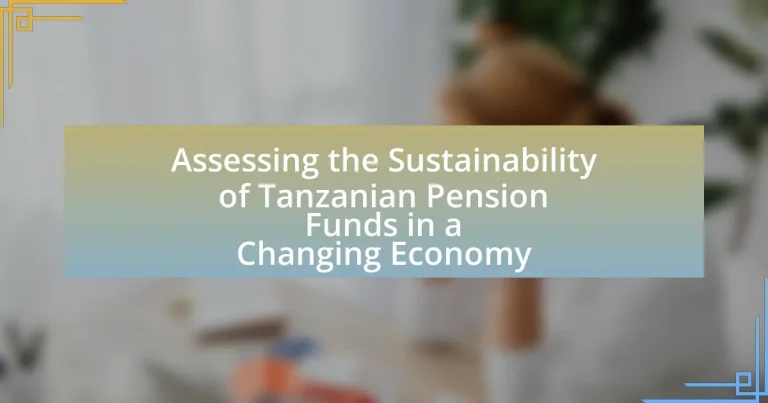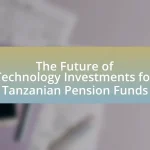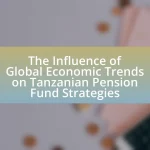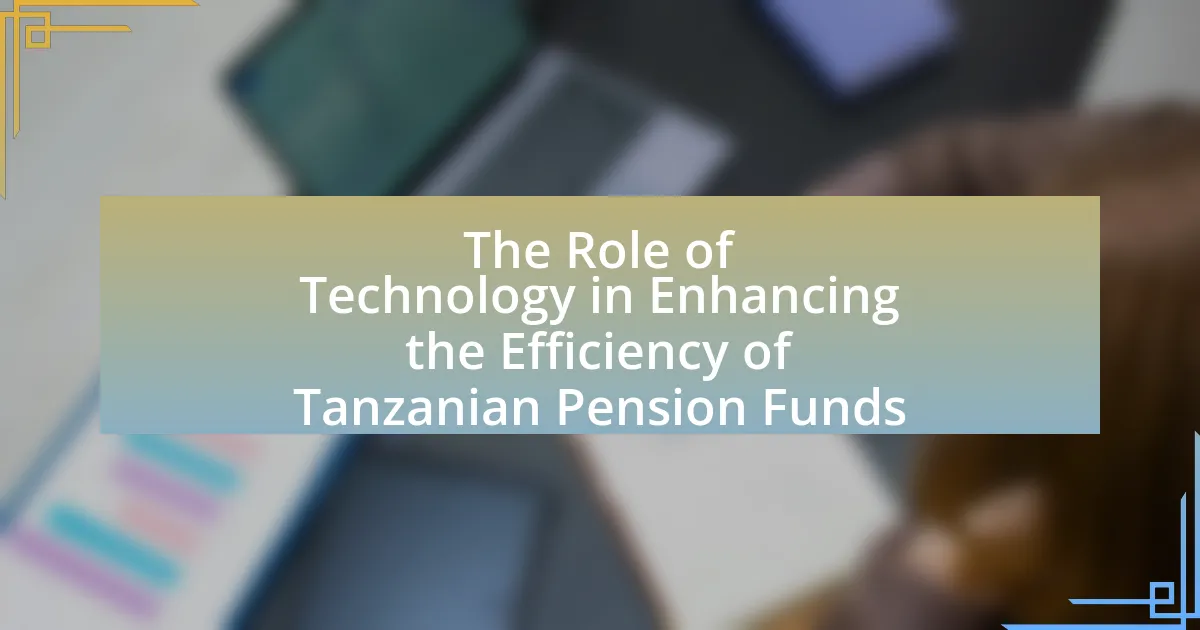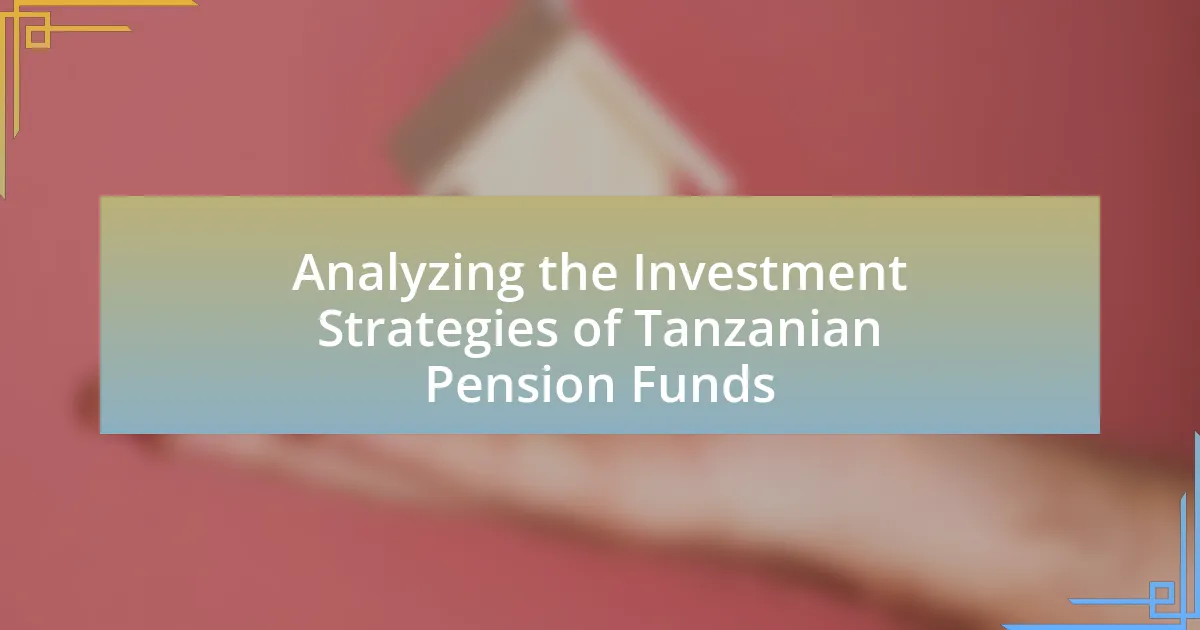The article focuses on the sustainability of Tanzanian pension funds amid economic changes, highlighting significant challenges such as low coverage rates, liquidity issues, and reliance on government bonds. It examines the operational framework of these funds, including contributions, investment strategies, and regulatory influences, while addressing the impact of inflation and investment risks on their viability. The article also discusses the importance of integrating environmental, social, and governance (ESG) factors into investment practices, the role of technology in enhancing sustainability, and practical steps stakeholders can take to improve the long-term health of pension funds in Tanzania.

What is the current state of Tanzanian pension funds?
The current state of Tanzanian pension funds is characterized by significant challenges, including low coverage rates and financial sustainability issues. As of 2023, only about 10% of the workforce is enrolled in formal pension schemes, which limits the funds’ ability to accumulate sufficient capital for future payouts. Additionally, the pension funds face liquidity problems and are heavily reliant on government bonds, which may not provide adequate returns to meet long-term obligations. Recent reforms aim to improve governance and expand coverage, but the effectiveness of these measures remains to be seen.
How do Tanzanian pension funds operate within the economy?
Tanzanian pension funds operate within the economy by collecting contributions from employees and employers, which are then invested in various financial instruments to generate returns for future payouts. These funds play a crucial role in providing financial security for retirees, thereby contributing to overall economic stability. As of 2021, the National Social Security Fund (NSSF) and the Public Service Pensions Fund (PSPF) are the primary pension schemes, managing billions of Tanzanian shillings in assets. The investments made by these funds include government bonds, real estate, and equities, which not only yield returns but also stimulate economic growth by funding infrastructure projects and businesses.
What are the key components of Tanzanian pension funds?
The key components of Tanzanian pension funds include contributions, investment strategies, benefits, and regulatory frameworks. Contributions are made by both employers and employees, forming the financial backbone of the funds. Investment strategies involve diversifying assets to ensure growth and sustainability, often including government securities, equities, and real estate. Benefits provided to members typically encompass retirement pensions, disability benefits, and survivor benefits. Regulatory frameworks, governed by the National Social Security Fund and the Pension Funds Act, ensure compliance and protect members’ interests, thereby maintaining the integrity of the pension system.
How do regulatory frameworks influence pension fund operations?
Regulatory frameworks significantly influence pension fund operations by establishing the legal and operational guidelines that govern fund management, investment strategies, and risk management practices. These frameworks dictate the minimum capital requirements, investment limits, and reporting obligations that pension funds must adhere to, ensuring financial stability and protecting beneficiaries’ interests. For instance, in Tanzania, the Pension Act of 2012 mandates specific investment portfolios and risk management protocols, which directly shape how pension funds allocate assets and manage liabilities. Compliance with these regulations is essential for maintaining the trust of stakeholders and ensuring the long-term sustainability of pension funds in a changing economic landscape.
What challenges do Tanzanian pension funds face in a changing economy?
Tanzanian pension funds face significant challenges in a changing economy, primarily due to inflation, regulatory changes, and investment risks. Inflation erodes the purchasing power of pension benefits, making it difficult for funds to maintain adequate returns for retirees. Regulatory changes can impose new compliance costs and affect fund management strategies, leading to potential inefficiencies. Additionally, investment risks, including market volatility and limited access to diverse investment opportunities, hinder the ability of pension funds to achieve sustainable growth. These factors collectively threaten the long-term viability and effectiveness of pension funds in providing financial security for retirees in Tanzania.
How does inflation impact the sustainability of pension funds?
Inflation negatively impacts the sustainability of pension funds by eroding the purchasing power of the assets held within these funds. As inflation rises, the real value of fixed-income investments, which are commonly held by pension funds, declines, leading to lower returns relative to the cost of living. For instance, if a pension fund’s investments yield a nominal return of 5% while inflation is at 3%, the real return is only 2%, which may not be sufficient to meet future liabilities. Additionally, higher inflation can increase the cost of benefits that pension funds must pay out, further straining their financial sustainability. Historical data shows that during periods of high inflation, such as the 1970s, many pension funds faced significant challenges in maintaining their obligations to retirees, highlighting the critical relationship between inflation and pension fund viability.
What role does investment strategy play in pension fund sustainability?
Investment strategy is crucial for pension fund sustainability as it directly influences the fund’s ability to meet long-term liabilities and generate adequate returns. A well-defined investment strategy aligns asset allocation with risk tolerance and market conditions, ensuring that pension funds can withstand economic fluctuations. For instance, research indicates that pension funds employing diversified investment strategies tend to achieve better risk-adjusted returns, which is essential for maintaining solvency and fulfilling obligations to beneficiaries. In Tanzania, where economic conditions are evolving, adapting investment strategies to include sustainable and responsible investments can enhance resilience and promote long-term growth, thereby supporting the overall sustainability of pension funds.
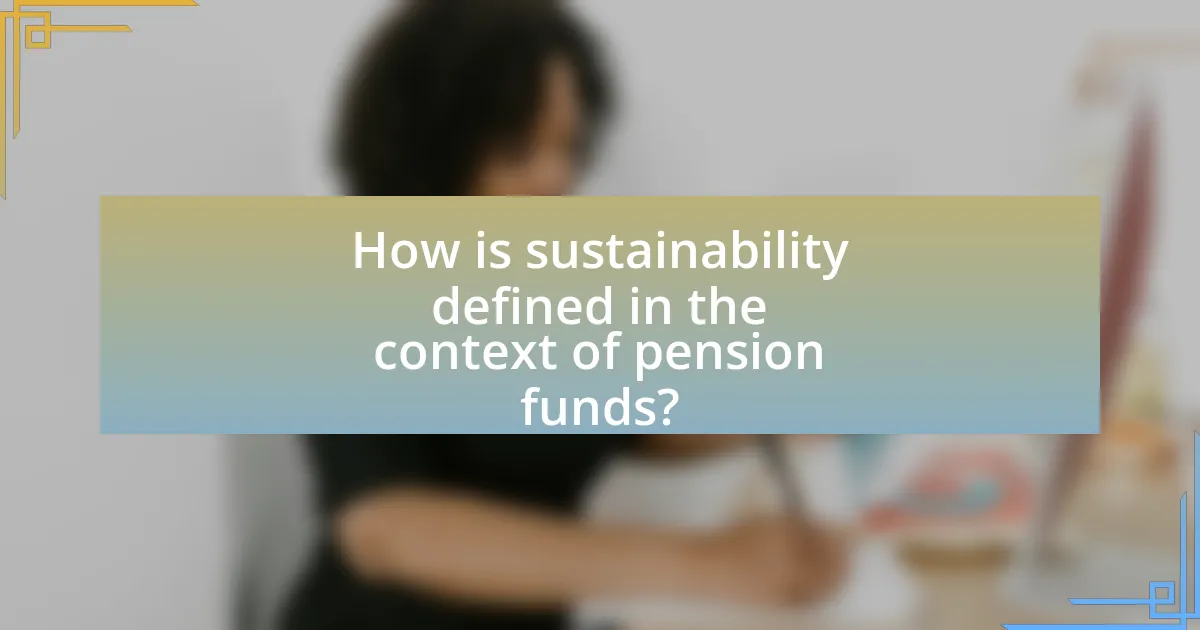
How is sustainability defined in the context of pension funds?
Sustainability in the context of pension funds refers to the ability of these funds to meet their long-term financial obligations while considering environmental, social, and governance (ESG) factors. This definition emphasizes that pension funds must not only focus on financial returns but also integrate sustainable practices that contribute to societal well-being and environmental health. Research indicates that pension funds incorporating ESG criteria can enhance risk management and potentially improve financial performance, as evidenced by a 2020 study from the Global Sustainable Investment Alliance, which reported that sustainable investments have outperformed traditional investments in various markets.
What metrics are used to assess the sustainability of pension funds?
Metrics used to assess the sustainability of pension funds include funding ratios, investment performance, and demographic trends. Funding ratios measure the assets of the pension fund relative to its liabilities, indicating whether it can meet future obligations. Investment performance evaluates the returns generated by the fund’s assets, which is crucial for long-term sustainability. Demographic trends, such as life expectancy and workforce participation rates, impact the inflow and outflow of funds, influencing overall sustainability. These metrics collectively provide a comprehensive view of a pension fund’s ability to remain viable over time.
How do financial returns relate to sustainability assessments?
Financial returns are increasingly linked to sustainability assessments as investors recognize that sustainable practices can enhance long-term profitability. Research indicates that companies with strong sustainability performance often experience lower risks and higher returns, as evidenced by a 2020 study published in the Journal of Sustainable Finance & Investment, which found that firms with high environmental, social, and governance (ESG) scores outperformed their peers in financial metrics. This correlation suggests that sustainability assessments can serve as indicators of financial health, particularly in the context of pension funds, where long-term investment strategies are crucial.
What social and environmental factors are considered in sustainability evaluations?
Sustainability evaluations consider various social and environmental factors, including community impact, resource consumption, waste management, and biodiversity preservation. Social factors assess how projects affect local communities, including job creation, equity, and social well-being. Environmental factors evaluate the ecological footprint, such as carbon emissions, water usage, and habitat conservation. For instance, the Global Reporting Initiative emphasizes the importance of these factors in sustainability assessments, highlighting their role in promoting responsible investment and corporate accountability.
Why is sustainability important for Tanzanian pension funds?
Sustainability is important for Tanzanian pension funds because it ensures long-term financial stability and risk management. By integrating sustainable practices, these funds can mitigate risks associated with environmental, social, and governance (ESG) factors, which are increasingly influencing investment performance. For instance, a study by the United Nations Environment Programme indicates that sustainable investments can lead to better risk-adjusted returns over time. Additionally, as Tanzania faces challenges such as climate change and resource scarcity, pension funds that prioritize sustainability are better positioned to adapt to these changes, ultimately safeguarding the retirement savings of their members.
How does sustainability affect long-term financial health?
Sustainability positively affects long-term financial health by reducing risks and enhancing investment opportunities. Companies that adopt sustainable practices often experience lower operational costs, improved brand reputation, and increased customer loyalty, which contribute to stable revenue streams. For instance, a study by the Global Sustainable Investment Alliance reported that sustainable investments have outperformed traditional investments, indicating that integrating environmental, social, and governance (ESG) factors can lead to better financial returns over time. Additionally, sustainable practices can mitigate risks associated with regulatory changes and resource scarcity, further securing long-term financial stability for organizations.
What are the implications of unsustainable practices for beneficiaries?
Unsustainable practices in the context of Tanzanian pension funds can lead to significant negative implications for beneficiaries, including reduced financial security and diminished retirement benefits. When pension funds engage in unsustainable investment strategies, they may face increased volatility and risk, which can jeopardize the long-term viability of the funds. For instance, investments in industries that harm the environment or violate social standards can result in reputational damage and financial losses, ultimately affecting the payouts to beneficiaries. Additionally, research indicates that sustainable investment practices can yield better financial returns over time; therefore, neglecting sustainability can lead to lower overall fund performance, directly impacting the financial well-being of retirees.
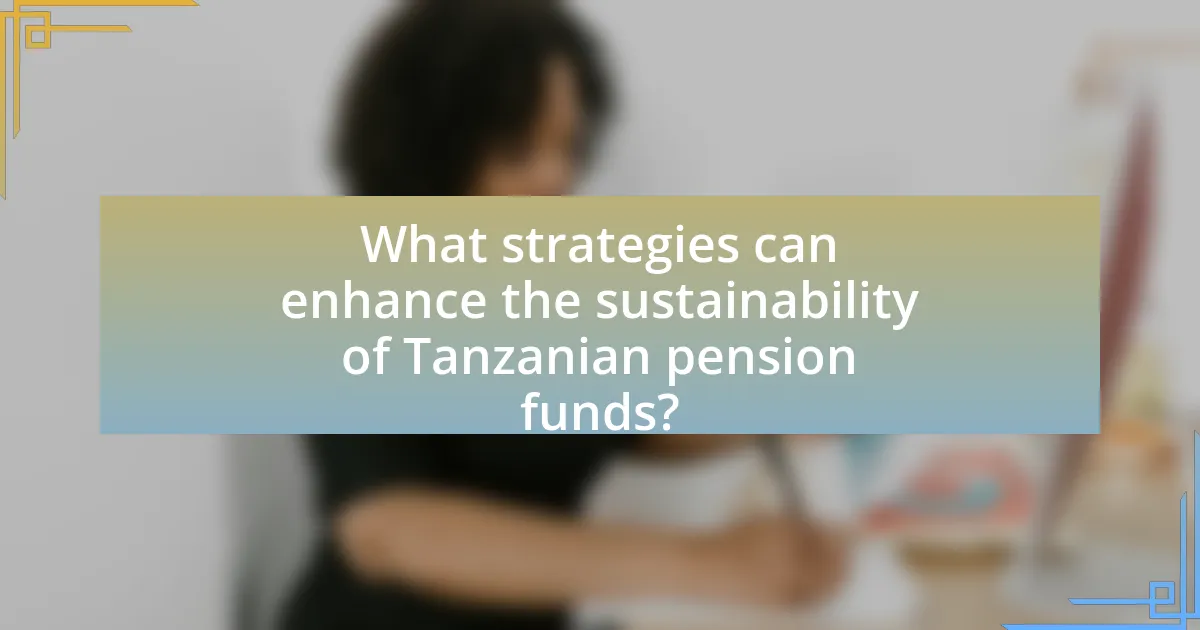
What strategies can enhance the sustainability of Tanzanian pension funds?
To enhance the sustainability of Tanzanian pension funds, implementing diversified investment strategies is crucial. Diversification can mitigate risks associated with market volatility and economic fluctuations, ensuring more stable returns over time. For instance, allocating assets across various sectors such as infrastructure, real estate, and equities can provide a balanced portfolio that withstands economic changes. Additionally, adopting responsible investment practices, including environmental, social, and governance (ESG) criteria, can attract more investors and improve long-term performance. Research indicates that funds integrating ESG factors often outperform traditional investments, highlighting the financial benefits of sustainability-focused strategies. Furthermore, enhancing regulatory frameworks to support transparency and accountability in fund management can build trust among stakeholders, ultimately contributing to the long-term viability of pension funds in Tanzania.
How can pension funds adapt to economic changes?
Pension funds can adapt to economic changes by diversifying their investment portfolios and incorporating risk management strategies. Diversification allows pension funds to spread their investments across various asset classes, reducing exposure to any single economic downturn. For instance, during periods of inflation, pension funds may increase allocations to real assets like real estate or commodities, which historically retain value. Additionally, implementing dynamic asset allocation strategies enables pension funds to adjust their investment mix in response to changing economic indicators, such as interest rates and market volatility. This adaptability is crucial for maintaining long-term sustainability and ensuring that pension obligations are met, as evidenced by studies showing that diversified portfolios tend to perform better during economic fluctuations.
What innovative investment approaches can be employed?
Innovative investment approaches that can be employed include impact investing, which focuses on generating social and environmental benefits alongside financial returns. This approach is increasingly relevant for Tanzanian pension funds as they seek to align their investments with sustainable development goals. For instance, a report by the Global Impact Investing Network indicates that impact investing has grown significantly, with assets under management reaching $715 billion in 2020, demonstrating its viability and appeal. Additionally, pension funds can explore green bonds, which finance projects with positive environmental impacts, thereby supporting sustainable infrastructure while potentially yielding competitive returns. This strategy aligns with global trends towards responsible investing, as evidenced by the increasing issuance of green bonds, which surpassed $1 trillion in cumulative issuance by 2021.
How can stakeholder engagement improve sustainability outcomes?
Stakeholder engagement can improve sustainability outcomes by fostering collaboration and ensuring diverse perspectives are considered in decision-making processes. Engaging stakeholders, such as employees, community members, and investors, allows organizations to identify sustainability challenges and opportunities more effectively. For instance, a study by the United Nations Environment Programme found that companies with strong stakeholder engagement practices are 30% more likely to achieve their sustainability goals. This engagement leads to better resource management, enhanced innovation, and increased accountability, ultimately resulting in more sustainable practices and outcomes.
What best practices should be adopted for sustainable pension fund management?
Sustainable pension fund management should adopt best practices such as integrating environmental, social, and governance (ESG) criteria into investment decisions. This approach ensures that funds not only seek financial returns but also contribute positively to societal and environmental outcomes. Research indicates that funds incorporating ESG factors can achieve better long-term performance, as they are less exposed to risks associated with unsustainable practices. For instance, a study by the Global Sustainable Investment Alliance reported that sustainable investments reached $35.3 trillion globally in 2020, reflecting a growing recognition of the importance of sustainability in investment strategies. Additionally, engaging with companies on sustainability issues can enhance accountability and drive positive change, further solidifying the fund’s commitment to sustainable practices.
How can transparency and accountability be improved in pension fund operations?
Transparency and accountability in pension fund operations can be improved by implementing robust reporting standards and enhancing stakeholder engagement. Establishing clear guidelines for financial disclosures ensures that pension funds provide regular, detailed reports on their investment strategies, performance, and fees, which fosters trust among beneficiaries. Additionally, involving stakeholders, such as members and regulatory bodies, in decision-making processes can create a culture of accountability. For instance, the International Organization of Pension Supervisors emphasizes the importance of transparency in governance to protect members’ interests and enhance the overall integrity of pension systems.
What role does technology play in enhancing sustainability?
Technology plays a crucial role in enhancing sustainability by enabling efficient resource management and reducing environmental impact. For instance, advancements in renewable energy technologies, such as solar and wind power, have significantly decreased reliance on fossil fuels, leading to lower greenhouse gas emissions. According to the International Renewable Energy Agency, the global renewable energy capacity reached 2,799 gigawatts in 2020, demonstrating a shift towards sustainable energy sources. Additionally, smart technologies in agriculture, like precision farming, optimize water usage and reduce chemical inputs, contributing to sustainable food production. These technological innovations not only promote environmental sustainability but also support economic growth by creating jobs in emerging sectors.
What practical steps can stakeholders take to ensure the sustainability of Tanzanian pension funds?
Stakeholders can ensure the sustainability of Tanzanian pension funds by implementing diversified investment strategies, enhancing regulatory frameworks, and promoting financial literacy among members. Diversified investment strategies reduce risk and improve returns, as evidenced by global best practices where funds that diversify across asset classes tend to perform better over time. Strengthening regulatory frameworks ensures that pension funds adhere to best practices and maintain transparency, which is crucial for building trust and stability in the system. Additionally, promoting financial literacy empowers members to make informed decisions regarding their retirement savings, leading to increased participation and contributions, ultimately enhancing the fund’s sustainability.
